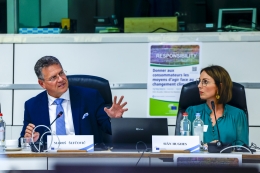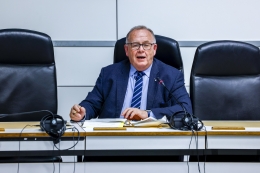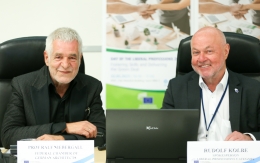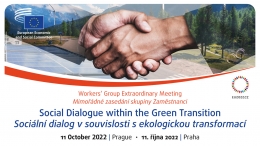European Economic
and Social Committee
Eiropas zaļais kurss
Eiropas Komisija 2019. gada 11. decembrī nāca klajā ar Eiropas zaļo kursu, ar ko pastiprina ES apņemšanos risināt ar klimatu un vidi saistītas problēmas, kas ir šīs paaudzes galvenais izaicinājums. Eiropas zaļā kursa mērķis ir pārveidot ES par modernu, resursefektīvu un konkurētspējīgu ekonomiku, nodrošinot, ka
- līdz 2050. gadam ir pielikts punkts siltumnīcefekta gāzu neto emisijām;
- ekonomikas izaugsme ir atsaistīta no resursu izmantošanas;
- novārtā nav atstāts neviens cilvēks un neviens reģions.
Lai ieviestu Eiropas zaļo kursu, ES īsteno visaptverošu iniciatīvu kopumu, tostarp politikas un likumdošanas priekšlikumus, kā arī finansēšanas instrumentu izstrādi un modernizāciju.
EESK, uzsverot ciešo saikni starp zaļo kursu un sociālo taisnīgumu, ir aicinājusi īstenot tā saukto zaļo un sociālo kursu. Ir svarīgi uzklausīt visu ieinteresēto personu viedokli, lai veicinātu ilgtspējīgus un konkurētspējīgus nākotnes uzņēmumus veselīgā vidē.
Eiropas zaļajā kursā liels uzsvars likts uz investīcijām, kā arī zaļas un ilgtspējīgas pārkārtošanās finansēšanu. Zaļais kurss ir līdzeklis, kā Eiropai pārvarēt Covid-19 pandēmiju. Eiropas zaļā kursa finansējums ir viena trešdaļa no 1,8 triljoniem eiro, kas NextGenerationEU atveseļošanas plāna ietvaros paredzēti ieguldījumiem, un ES septiņu gadu budžeta līdzekļi. Finansēšanas iespējas ir paplašinātas, lai krīzi izmantotu kā iespēju veikt pārmaiņas Eiropas nākotnes interesēs.
EESK loma ir būtiska Eiropas zaļā kursa iniciatīvu un darbību īstenošanas uzraudzībā. EESK sagatavo atzinumus un rīko pasākumus (sk. izvēlni šīs lapas kreisajā pusē), lai nodrošinātu, ka ES iestādes ņem vērā organizētas pilsoniskās sabiedrības viedokli un ka zaļā kursa iniciatīvas atbilst ekonomiskajiem un sociālajiem apstākļiem un pilsoniskajām norisēm uz vietas.
Transversālā un visaptverošā rakstura dēļ Eiropas zaļo kursu aplūko visas EESK specializētās nodaļas un CCMI.





